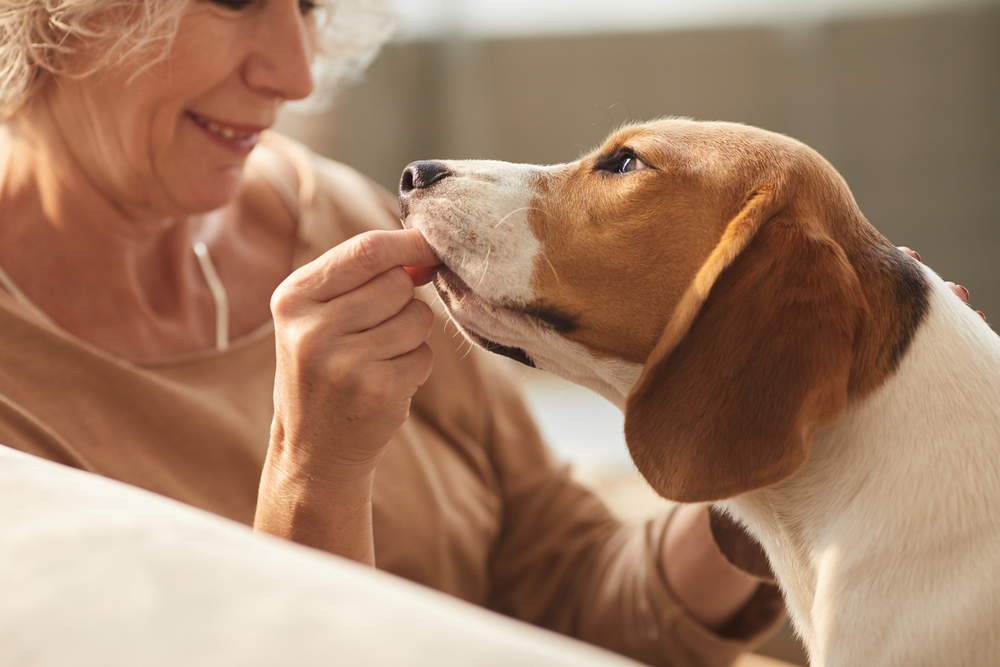This is what PhD candidate Ineke Van Herwijnen, who defends her thesis on 28 August with the chair group Behavioural Ecology, concludes. Van Herweijnen studied different approaches to raising dogs. ‘Many owners perceive their dog as a member of the family, or as a child’, she says. ‘The effect of different approaches in parenting children has been extensively researched, but little is known on the effect on dogs. While this information could allow us to improve the way dogs are raised and hopefully reduce problematic behaviour that leads to dogs being rehomed or turned over to shelters.’
Boundaries
Previously, Van Herwijnen stated that dog owners raise their pooch in a way similar to how they parent their child. Some adopt an authoritarian approach. For these owners, correcting unwanted behaviour is their main focus. As soon as the dog exhibits behaviour that is not allowed, the animal is punished. The influential approach also centres on abiding by the rules but is more focused on training or the dog’s emotions. ‘This type of owner will comfort the dog when he is afraid.’ The other group is characterised by stimulating desired behaviour through rewards. In children, the influential approach yields the best results. That is: children raised this way to develop into happier and more successful adults. The majority of the dog owners in the study take this approach.
Research shows that the approach to raising children plays a role in developing excess weight; this appears to apply equally to dogs.
Ineke Van Herwijnen, PhD-candidate with the chair group Behavioural Ecology
The permissive (indulgent) style is yet another approach to raising dogs. There are few boundaries, and the animal is often permitted to do as it pleases. Based on a survey conducted among 2303 dog owners, Van Herwijnen discovered that dogs who have an indulgent owner are frequently overweight, which was to be expected, as these owners have trouble denying the dog a treat when he begs. ‘Research shows us that this approach to raising children plays a role in developing excess weight; this appears to apply equally to dogs.
Bond with dog
Van Herwijnen discovered a link between the style of raising the dog and the relationship between the animal and its owner. ‘We discovered that those with an authoritarian style were less satisfied with their dog’. Those with an influential approach felt less burdened by the dog. Van Herwijnen also saw that dogs with this type of owner sought eye-contact with their owner more frequently. ‘Research tells us that eye-contact is essential in building a relationship between humans and dogs.’ Van Herwijnen cannot say with certainty whether there is a causal connection. ‘We know that dogs may react aggressively to being corrected, which could damage the bond with an authoritarian owner. Or the owner may feel insecure over raising a dog and thus adopt an authoritarian approach. On the other hand, we often see that owners who are authoritarian towards their dogs have the same approach to their children, which suggests the trait was present already.’
Reaching a broader audience remains a problem, as obedience schools are most often visited by people with a higher level of education and income.
Van Herwijnen also studied whether it was possible to use videos and training materials to motivate owners to adopt a different approach. ‘Reaching those who would most benefit from this knowledge proved difficult.’ The group consisted mostly of educated women who felt very committed to their dog’s education. Van Herwijnen: ‘Reaching a broader audience remains a problem, as obedience schools are most often visited by people with a higher level of education and income, who have carefully considered getting a dog. We want to reach those people that ‘just get a dog’ because they think it may be fun, and have not given its education much consideration. These are, after all, often the animals that are taken to a shelter by their sad owners. Moreover, we know that parenting styles for dogs and children are frequently alike and that the neglect of animals is often linked to the neglect of children.’
Van Herwijnen seeks to experiment with low-threshold programmes in supermarkets, pet stores and veterinary clinics in an effort to reach this public.

 Photo: Shutterstock
Photo: Shutterstock